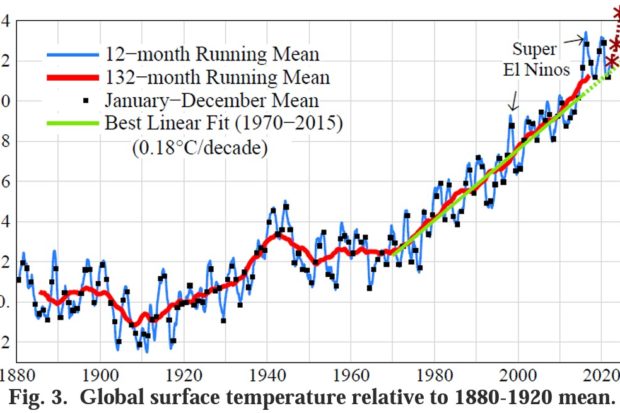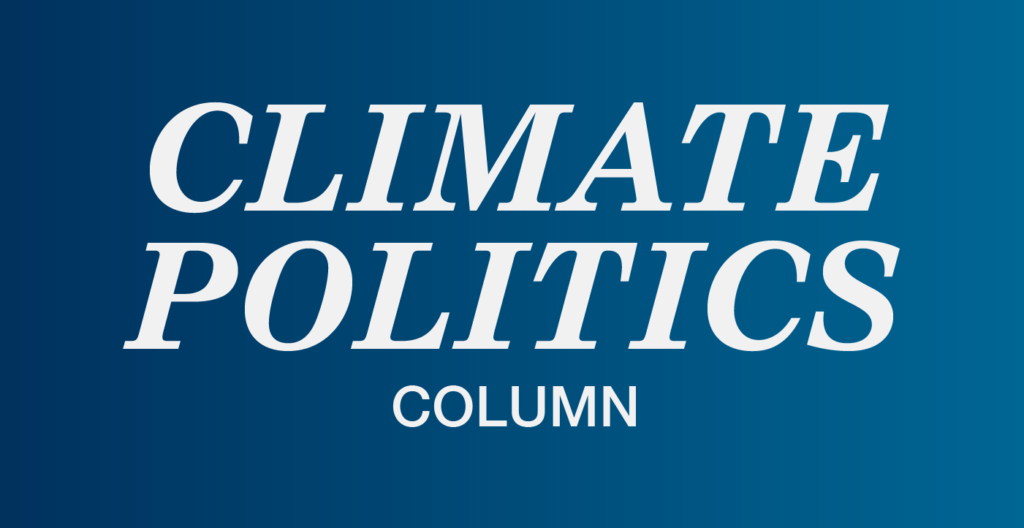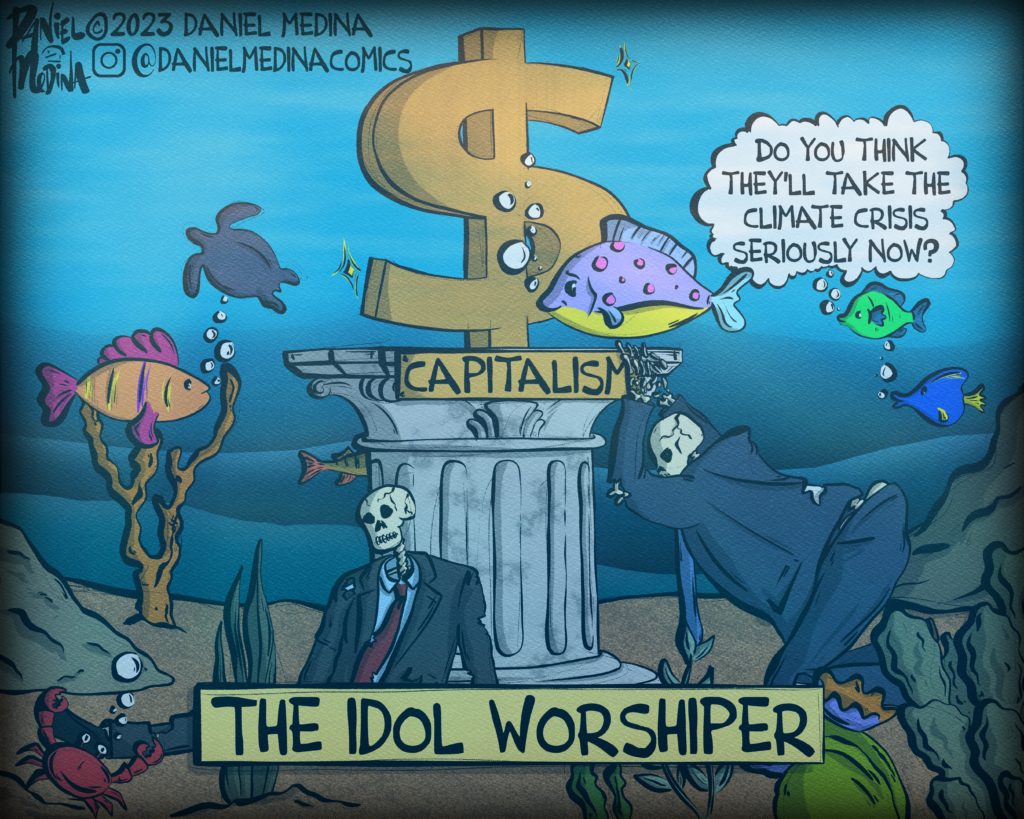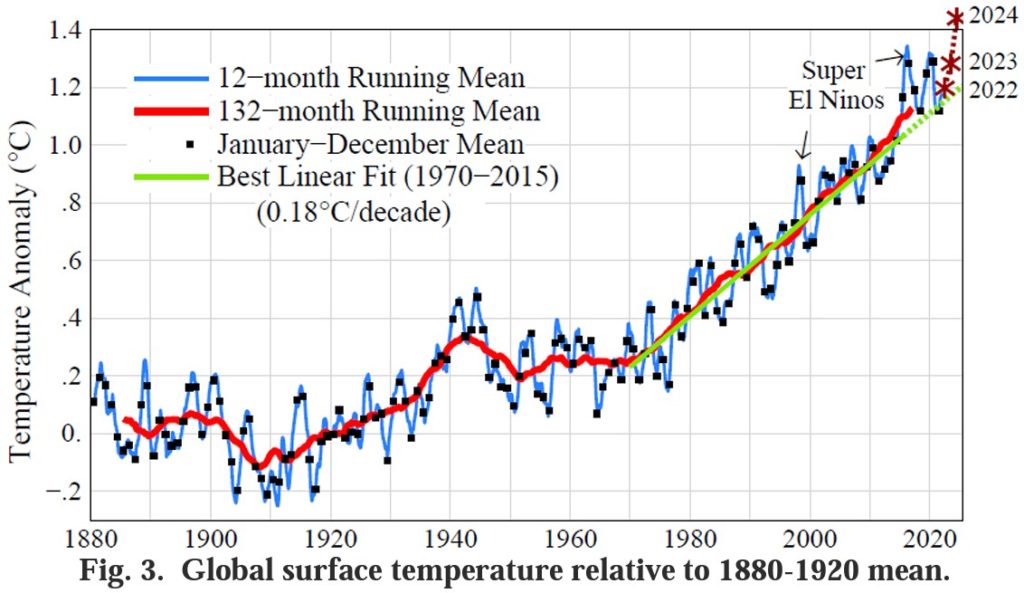

It’s 2023. Do you know where your climate solutions are?
Between the climate change doomer camp of all-is-lost fatalism and the boomer tribe’s false promise of win-win solutions lies a path to survival for much of humanity into the distant future, rather than just a few more decades of excessive consumption for some.
The shift in direction needed will require a hard turn to get there in time, one requiring near unanimity of opinion due to the resulting social order disruptions, which are coming regardless due to ever-destabilizing weather patterns. Dr. James Hansen and colleagues wrote last summer, “We suggest that 2024 is likely to be off the chart as the warmest year on record.”
Blocking the path to survival—which the United Nations says will be needed by 700 million climate refugees worldwide this decade alone, meaning far more people than the entire population of North America will be dislocated—are wealthy elites and their support system: that 20% of adults working in industrialized nations’ white-collar class as professionals, managers and small farm and business owners, plus their retired predecessors.
Unfortunately, these are the people in power, and they’re quite comfortable because the system is working just fine for them. It also helps that they’re easily distracted by entertainment and travel. A few donations to worthy causes and membership in some relevant organizations and they figure they’ve done their part.
To win their votes, authoritarian-minded Republicans and virtue-signaling Democrats first pledge allegiance to a set of party positions on every social issue. It’s easy to be a Democrat, easier to be Republican. Simple even. Just don’t cross the bright line that’s there for every candidate, officeholder, political action committee, campaign contributor, journalist and voter to see.
But the line splitting our political ledger ends at a bottom line of far more importance: American capitalism. Below that line Democrats and Republicans alike swear fealty to their financial backers and an economic system defined by University of Wisconsin–Madison sociologist Joel Rogers as “low-road capitalism.”
Rogers’ work is cited in the 1619 Project article by Matthew Desmond, “In order to understand the brutality of American capitalism, you have to start on the plantation.”
Desmond describes the state of our state: “In a capitalist society that goes low, wages are depressed as businesses compete over the price, not the quality, of goods; so-called unskilled workers are typically incentivized through punishments, not promotions; inequality reigns and poverty spreads.
“In the United States, the richest 1 percent of Americans own 40 percent of the country’s wealth, while a larger share of working-age people (18–65) live in poverty than in any other nation belonging to the Organization for Economic Cooperation and Development.”

In short, this country’s legacy of slavery, plantations and human exploitation beyond measure gave birth to many modern-day corporate financing structures and management practices. These were originally created to fund and capitalize on the cotton boom of the 18th and 19th centuries, speculative market crashes and all, except then enslaved humans rather than land, more of which was being constantly cleared by genocide, were used as collateral for loans with age-based depreciation tables and all. Thomas Jefferson mortgaged 150 enslaved people to build Monticello, Desmond points out.
That legacy is also found in contemporary politics, which haven’t changed much through the centuries when it comes to politicians’ support for the low road. Many working-class White Americans enjoyed a 40-year reprieve that began crumbling for most in the 1980s, about the same time hope for stopping the worst impacts of climate change was officially crossed.
Now society is trapped on the runaway climate train. Partying in its caboose is the political class of elected officials and their backers; collectively, they lack the education and experience needed to understand the gravity of scientists’ warnings and the will to lead the transformation of our economy being called for by the United Nations.
“Elected officials have largely been unwilling to choose policies they fear could cost them the next election when the benefits might not be felt for several more decades,” explained Washington Post reporters Sarah Kaplan and Brady Dennis in their April 2022 article, “The world is running out of options to hit climate goals, U.N. report shows.”
Instead of leading on solutions, politicians are being led by industry yet again. Billions of taxpayer dollars are being misdirected into cap-and-trade market mechanisms that allow continued pollution of every type and perpetuate low-road capitalism rather than seeking to fundamentally alter the system.
In the coming months and years, Fresno residents will see their city council members, mayor, county supervisors, and state and federal representatives proclaiming their climate awareness and solutions. Don’t be fooled.
The Producers Dairy’s greenwashing campaign will continue to offer photo ops for low-road capitalists and their political pawns at the cost of people’s health from east Mendota to the Tower District.
A prominent Fresno developer’s favorite finger puppets on the City Council will propose a “climate smart” subdivision ordinance, but it will be a charade. Industrial trucking warehouses, biomass operations and waste haulers will be declared “green” industries and allowed to expand throughout south Fresno, despite a city council with a 6-1 Democratic to Republican advantage.
There is no political separation on this front due to billions in public subsidies.
Accountability-free, identity politics will continue to determine most people’s political involvement, and the low-road priorities of our elected representatives will be decided behind closed doors. It seems the more the climate changes, the more politics stay the same.


This is excellent. This is what you learn when you read about, and listen to, science. Our economics must change.